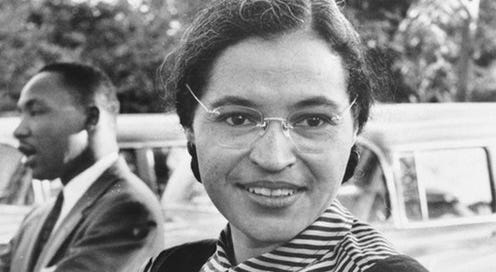On the evening of December 1, 1955, Rosa Parks boarded the Cleveland Avenue bus in Montgomery, Alabama, to head home after work. The bus was split into two sections: the front for white passengers and the back for black. Rosa took a seat in the first row of the section designated for black people.
As passengers filled the bus, the driver approached Rosa's row and told everyone to move back to make space for white passengers. Three obliged. Rosa refused.
"Well, I'm going to have you arrested," the bus driver said.
"You may do that," Rosa replied calmly as she remained seated with her hands resting in her lap.
The law required black passengers to give up their seats when told by the driver, so the police soon arrived and took Rosa to jail. A few days later, her trial began. Rosa was found guilty and fined.
Her arrest and conviction sparked a city-wide boycott of the Montgomery bus system. It was led by 26-year-old Dr. Martin Luther King Jr., who said at the start,
"Mrs. Rosa Parks is a fine person. And since it had to happen I'm happy it happened to a person like Mrs. Parks, for nobody can doubt the boundless outreach of her integrity. Nobody can doubt the height of her character, nobody can doubt the depth of her Christian commitment and devotion to the teachings of Jesus … And just because she refused to get up, she was arrested...
Now let us say that we are not here advocating violence. We have overcome that...The only weapon we have in our hands this evening is the weapon of protest...My friends, don't let anybody make us feel that we ought to be compared in our actions with the Ku Klux Klan or the White Citizens Councils. There will be no white persons pulled out of their homes and taken out to some distant road and murdered. There will be nobody among us who will stand up and defy the Constitution of this nation. We only assemble here because of our desire to see right exist."
In a city where two-thirds of bus riders were black, the boycott made a financial impact. The city aggressively attempted to end the boycott, taking several actions, including putting Rosa and 89 other protestors on trial, though much of the focus would be on Martin. A third trial followed, but this one was initiated by civil rights activists. The case Browder v. Gayle challenged the constitutionality of segregated buses. In 1956, the Supreme Court upheld a lower court's ruling that bus segregation was unconstitutional, leading to the legal end of bus segregation. After 381 days, the boycott ended, having made its impact and galvanized the modern civil rights movement.
In reflecting back on that moment on the bus, Rosa wrote,
"People always say that I didn't give up my seat because I was tired. But that isn't true. I was not tired physically, or no more tired than I usually was at the end of a working day. I was not old, although some people have an image of me as being old then. I was forty-two. No, the only tired I was, was tired of giving in."
Despite her newfound fame, life after the boycott was difficult for Rosa. Both she and her husband lost their jobs as a result of their activism, and the couple faced constant threats to their safety. In 1957, they relocated to Detroit, where Rosa continued her civil rights work, focusing on housing discrimination and economic justice issues.
Rosa lived to see the monumental changes her actions helped bring about. The Civil Rights Act of 1964, the Voting Rights Act of 1965, and the gradual dismantling of segregation were tangible results of the work she took part in. Yet, she was never one to seek the spotlight. Rosa's humility was as much a part of her legacy as her defiance.
Sources:
Aitken, Robert. “Rosa Parks: An American Icon.” Litigation, vol. 29, no. 2, 2003, pp. 47–64. JSTOR, http://www.jstor.org/stable/29760342. Accessed 11 Oct. 2024.
Boyd, Herb. “In Memoriam: ROSA PARKS.” The Black Scholar, vol. 35, no. 4, 2006, pp. 42–44. JSTOR, http://www.jstor.org/stable/41069175. Accessed 11 Oct. 2024.
Parks, Rosa, and Haskins, James. Rosa Parks: My Story. United States, Perfection Learning, 1999.
Wikimedia Commons, Wikimedia Foundation, https://commons.wikimedia.org/wiki/File:Rosaparks.jpg





she had great strength
Jupp, I was tired of giving in
Legendary words